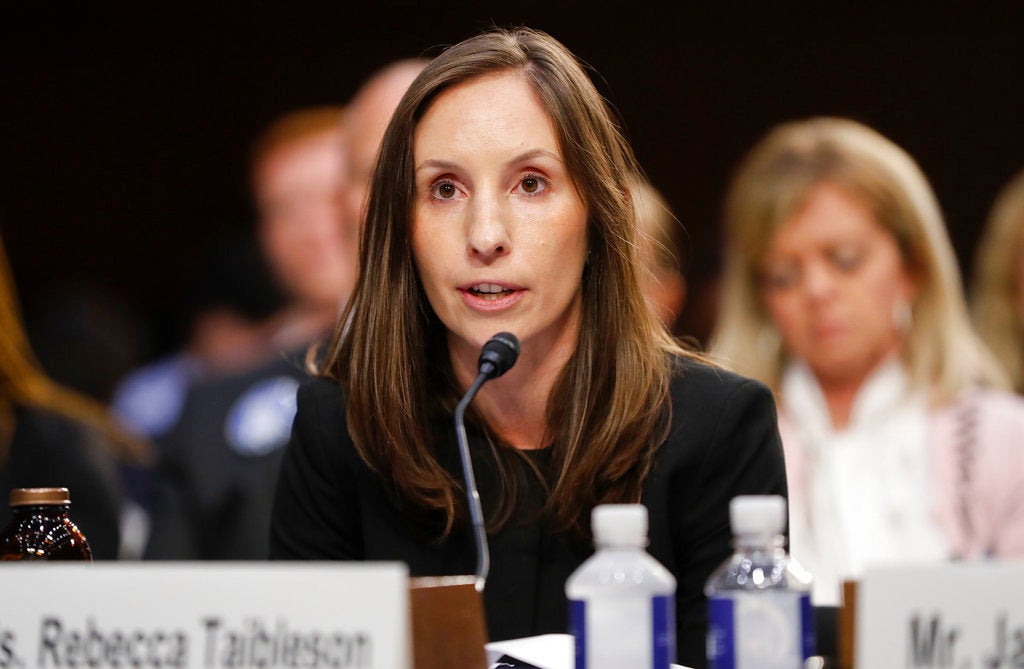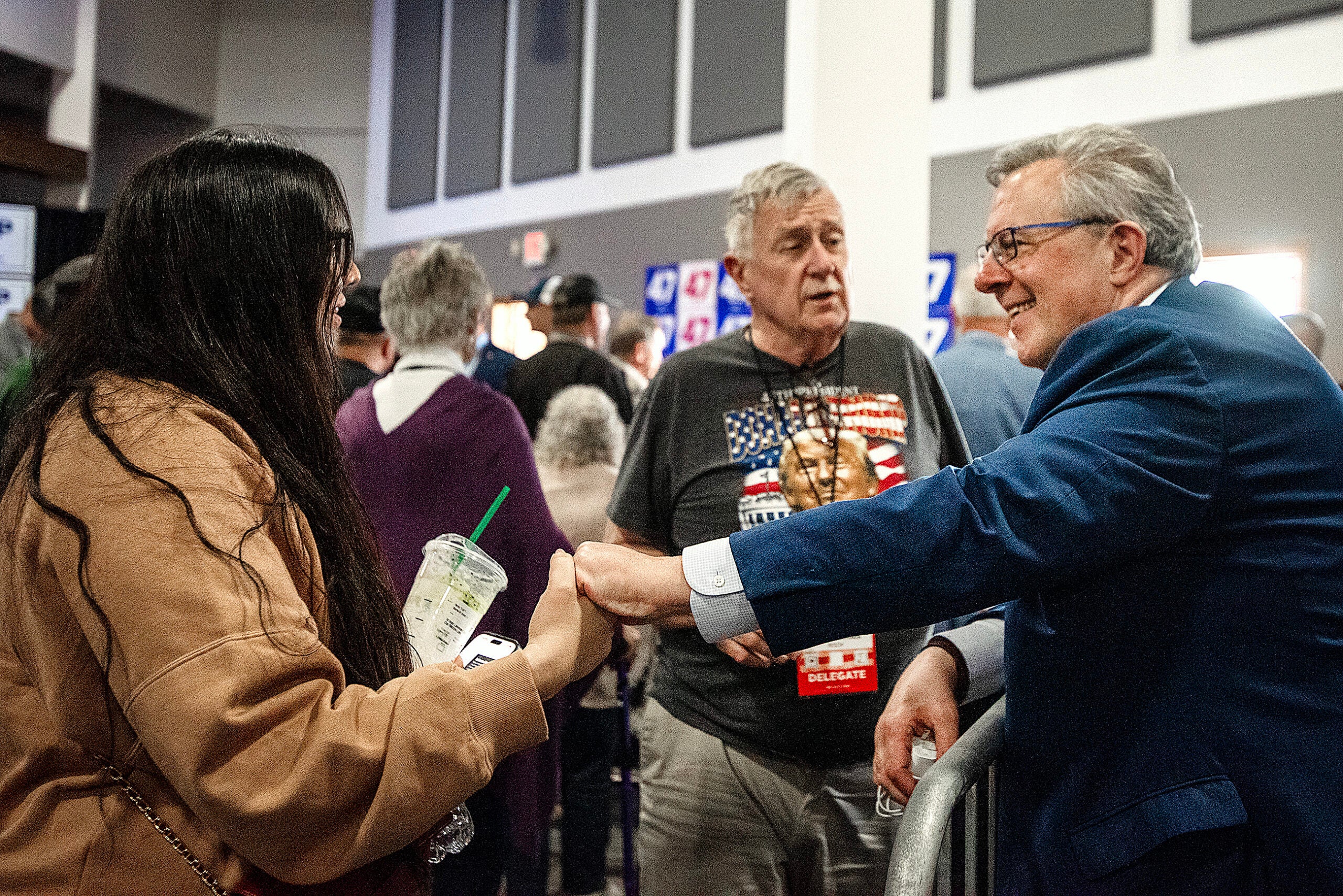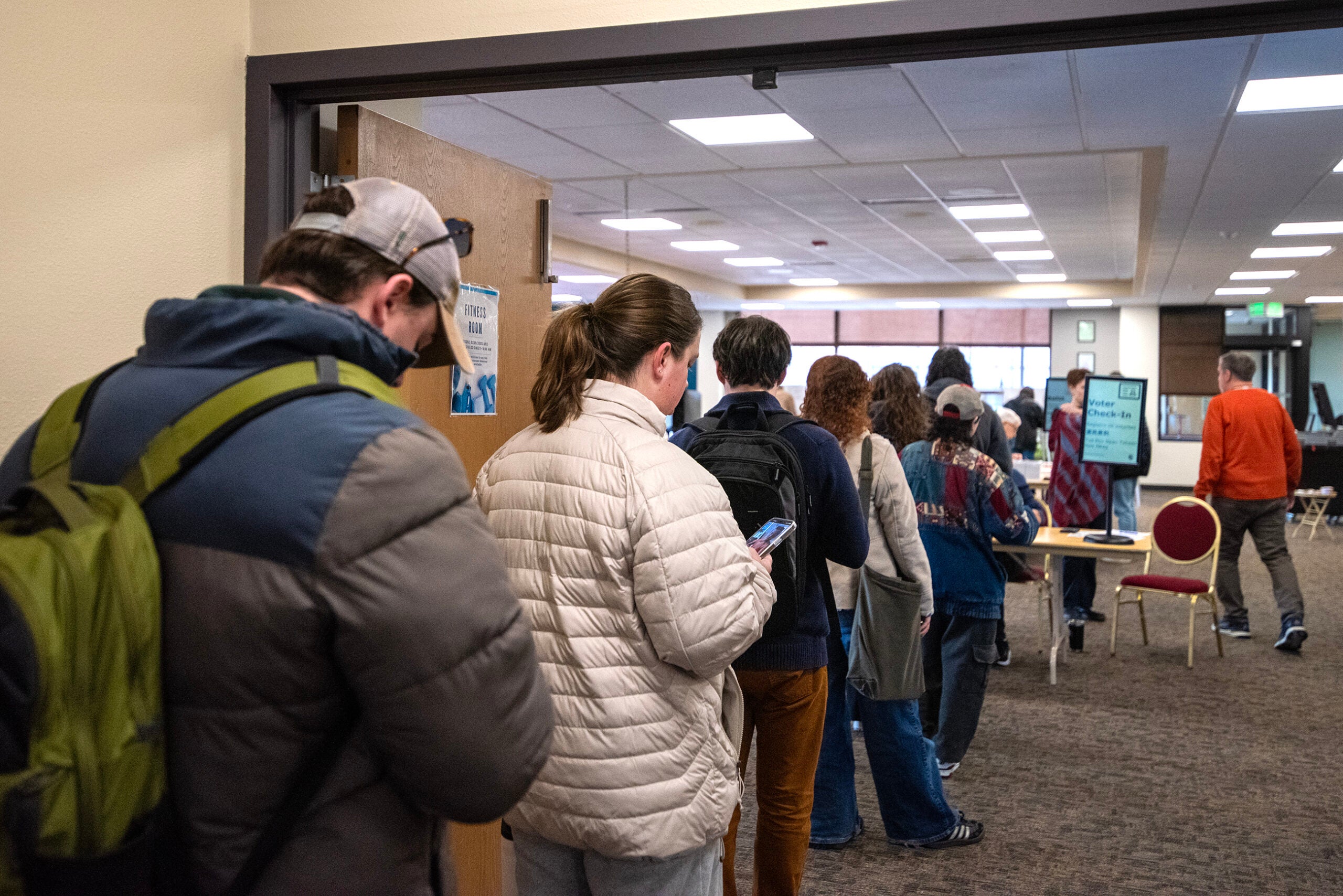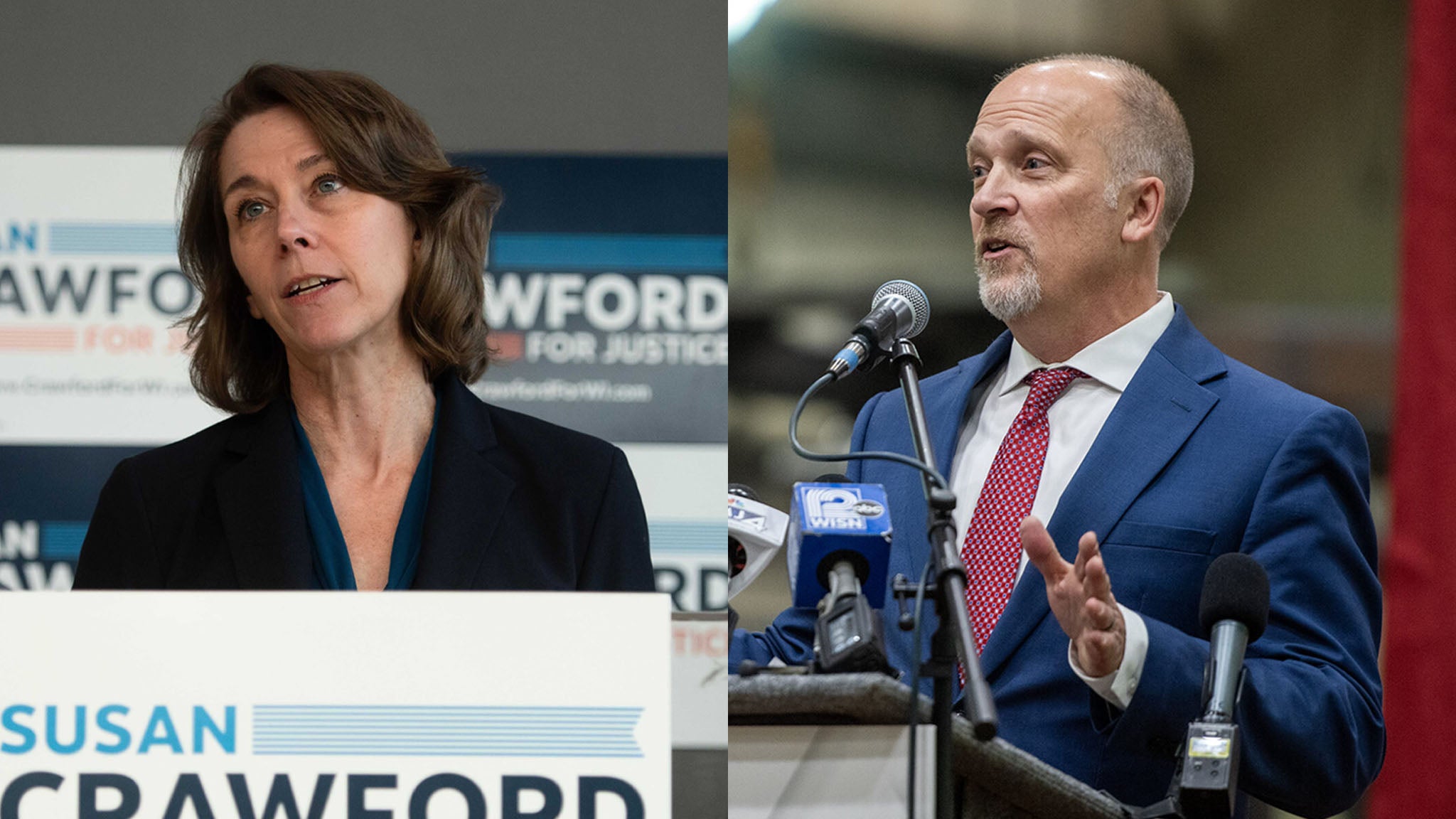Since 1985, the state of Wisconsin has paid hunters for dogs that are killed by wolves. We talk with one senator who has proposed a bill to end this. We also chat with another Wisconsin Supreme Court candidate and take a look at the details of President Trump’s military parade proposition.
Featured in this Show
-
Wisconsin Supreme Court Candidate: Rebecca Dallet
Three candidates are vying for the open Wisconsin Supreme Court seat after Justice Michael Gableman decided to not seek re-election after serving one 10-year term.
The candidates — Tim Burns, Rebecca Dallet, and Michael Screnock — will face off in a primary election Tuesday, Feb. 20 to narrow the field to two. The candidates sat down for interviews with WPR’s “Central Time” in advance of the primary.
Dallet, a Milwaukee County Circuit Court judge, gave the following interview. Interviews with Burns and Screnock can also be found online. All transcripts have been edited for clarity and brevity.
On Why She’s Running
I am running because we are at a time when our rights are under attack, every day, tweet by tweet. And we have a broken Supreme Court, and we need someone with values and experience to step up and repair that court. I am currently a judge for almost a decade, a prosecutor before that for more than a decade. I’ve worked for over 20 years in our courts, protecting the vulnerable, fighting for our rights. and I want to keep doing that on our Wisconsin Supreme Court.
On Civility On The Court And Her Experience
I think that distinguishes me from my opponents as well because I am someone who can work with others.
I know what it’s like having managed a courtroom, having managed attorneys and jurors for 10 years now. I know what it’s like to disagree with someone but to (also) be able to get along with them, and that’s an important part of making sure that we have faith in courts as well as that civility.
In looking at Mr. Burns, the way he’s acted throughout the campaign — his blatant statements that he’s not planning on working with anyone… I will start this term on Aug. 1 certainly protecting our rights and values that make Wisconsin great, but also with an ability to work with the people that are on that court to do the best we can for the people of our state.
On The Role Of Politics, Values And The Possibility Of Bias For Judges
I think it’s important that the voters do know my values, and I’m happy to share those values with them.
I care about clean air and water. I care about having great public schools, workers rights, equal protection under the law, women’s rights.
Those are my values, but I, as a judge, I know that I can’t take positions on cases before they come in front of a court, and we need to make sure that our judges are fair and impartial. We need to make sure when people go in front of a judge or justice that they think they’re going to get a fair shake, that they know that they’re going to get an air shake. And when you come out taking positions on issues, pre-deciding cases, you risk that fairness that we all demand from our courts, that we’re missing right now and we need to get back to that.
… It’s very different to express a personal value and to still be able to be fair and impartial, to know what it’s like. And I’m the only candidate that has 10 years of knowing what it’s like to apply the law and apply it to the facts of the case. That’s very different than coming out and making specific statements about specific legislation, for example, which is what Mr. Burns has done.
That is a situation where someone might ask you to recuse yourself, but we do all have values, that’s true… We can share those values. I’m happy to do that.
I also am really the only one that understands in this race the need to put politics aside and to make sure that we elect someone who is going to be fair and impartial. It’s not progressive to make statements on cases and to give people a sense that you’re not going to be able to be fair. That’s not justice, that’s not progressive.
On When It’s Appropriate For A Justice To Recuse Herself Or Himself
This is a symptom of a system that’s broken.
When I talk about a broken Supreme Court, we can look to our lack of recusal and we look specifically to the John Doe case, and that was a case where $2.25 million was sent by a special interest group on Justice Gableman’s campaign to buy a justice and then appeared in front of him as a party to the case, the organization that spent that money and Justice Gableman was asked to recuse himself and he refused to do that.
That is a symptom of a system that’s broken.
We need to get a strong recusal role, something that’s meaningful so that the public can have confidence that justices and judges are going to be fair — and that’s something I’ve been talking about throughout the campaign from the very beginning, for me to really get back to restoring confidence in our leaders, trust in our courts. We can only do that with electing someone who has the values and experience, and I’m the only candidate that has over 20 years, over 10,000 cases working in our courts. I’m also endorsed by more than 200 judges right now, people that know our courts are endorsing me because they know that I’m the one that can do this job.
On Her First Campaign Advertisement About President Donald Trump
We’ve been talking about the state of our country, the state of our state right now. I think it’s important for all of us to understand where we are right now.
We’re at a moment in time where we our feeling threatened. All of the values that (I) talked about — clean air and water, and equal protection, and women — are under attack, and this is something we all feel and we all relate to, and I’m the candidate that is going to be able to protect those values at this critical time.
And there is just too much at stake right now to cast someone without the experience needed to advocate for the policies that need to be changed and to make sure to protect those values … to the decision-making of the court.
On Whether The Ad Is An ‘Overt Political Statement’
This ad is talking about values … It is the same message that I’ve had from Day 1 of this campaign, and it is important that we look at this all in the context of the world that we’re living in.
I think an additional look at the moment in time we have here for women. Women have been under attack, and women are finally feeling strong enough and safe enough to be able to speak out against the harassment that women have suffered for years; and as a (female) candidate, as someone who has experience both through watching in court and in my own experiences not having a level playing field, I think it’s really important to make sure that that playing field is leveled and that we recognize that here in our state of Wisconsin that only, of all the judges we have in our state, 1 in 5 are women…
This is about the time we’re living in. And this is about the values we care about and leveling the playing field for everyone in our state.
-
Wisconsin Supreme Court Candidate Interview: Rebecca Dallet
Three candidates are competing for Wisconsin’s open Supreme Court seat, and will face off in a primary election on February 20th to narrow the field to two. Rebecca Dallet, a Milwaukee County circuit judge, is one of those candidates. She joins us for a candidate interview.
-
State Lawmaker Proposes Ending Payments For Hunting Dogs Killed By Wolves
Wisconsin has reimbursed hunters for dogs killed by wolves since 1985. It’s the only state in the country with such a program.
State Sen. Fred Risser, D-Madison, has introduced a proposal to change that.
“I just don’t think society should be responsible for compensating owners of hunting dogs that are injured or killed by wolves,” Risser said. “If a hunter wants to protect his dogs against such costs, he can take out insurance.”
The bill — which would end the compensation program for hunting dogs — was referred to the Senate Committee on Sporting Heritage, Mining and Forestry on Feb. 7. It’s still in circulation.
As The Capital Times reports, the Wisconsin Department of Natural Resources reimbursement program was originally intended “to mitigate damage caused by an expanding state wolf population.” During the winter of 2016-17, the gray wolf population in the state grew to a record high. Still, the species remains federally protected by the Endangered Species Act.
Under current law, if a hunter believes their dog has been injured or killed by a wolf, the case is investigated by the U.S. Department of Agriculture Wildlife Services. The DNR policy only compensates hunters if their dogs are killed by wolves, not other animals.
Risser said his bill won’t take compensation away from people whose pets or livestock have been killed by wolves. Instead, it focuses on hunting dogs, whose owners he says are voluntarily putting their animals in harm’s way.
“I suspect if someone does not read the content of the bill or know what it is, they’re fearful that I’m taking all compensation away,” Risser said. “That is not true. In fact, I’m taking very limited compensation away.”
Last year, the state paid a record $99,400 to hunters whose dogs had been killed by wolves. That’s double the year before, and Risser worries about the cost increase.
He says constituents are generally supportive of the measure, and he has garnered several signatures on the bill. However, he introduced a similar bill last year that failed to pass.
“It’s kind of late in the session, and quite honestly it doesn’t look like it’s moving very fast,” he said. “But I’ve gotten a number of cosponsors to the bill, and maybe next time around we’ll be able to get over the hump.”
-
Wisconsin Lawmaker Wants To End Payments To Hunters For Dogs Killed By Wolves
A Wisconsin lawmaker wants the state to stop paying hunters for dogs that are killed by wolves. Join us for a conversation with the legislator about this proposed bill.
-
Trump Plans Military Parade In D.C.
With France’s “Bastille Day” as a model, President Trump is planning a grand military parade in Washington, D.C., with soldiers and tanks rolling down Pennsylvania Avenue. It would be the first in the United States since the 1991 parade celebrating the end of the Gulf War. We talk with an expert about the costs and benefits of such a plan.
Episode Credits
- Rob Ferrett Host
- J. Carlisle Larsen Host
- Chris Malina Producer
- Breann Schossow Producer
- Gretchen Brown Producer
- Rebecca Dallet Guest
- Fred Risser Guest
- Peter Feaver Guest
Wisconsin Public Radio, © Copyright 2026, Board of Regents of the University of Wisconsin System and Wisconsin Educational Communications Board.





